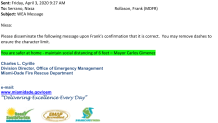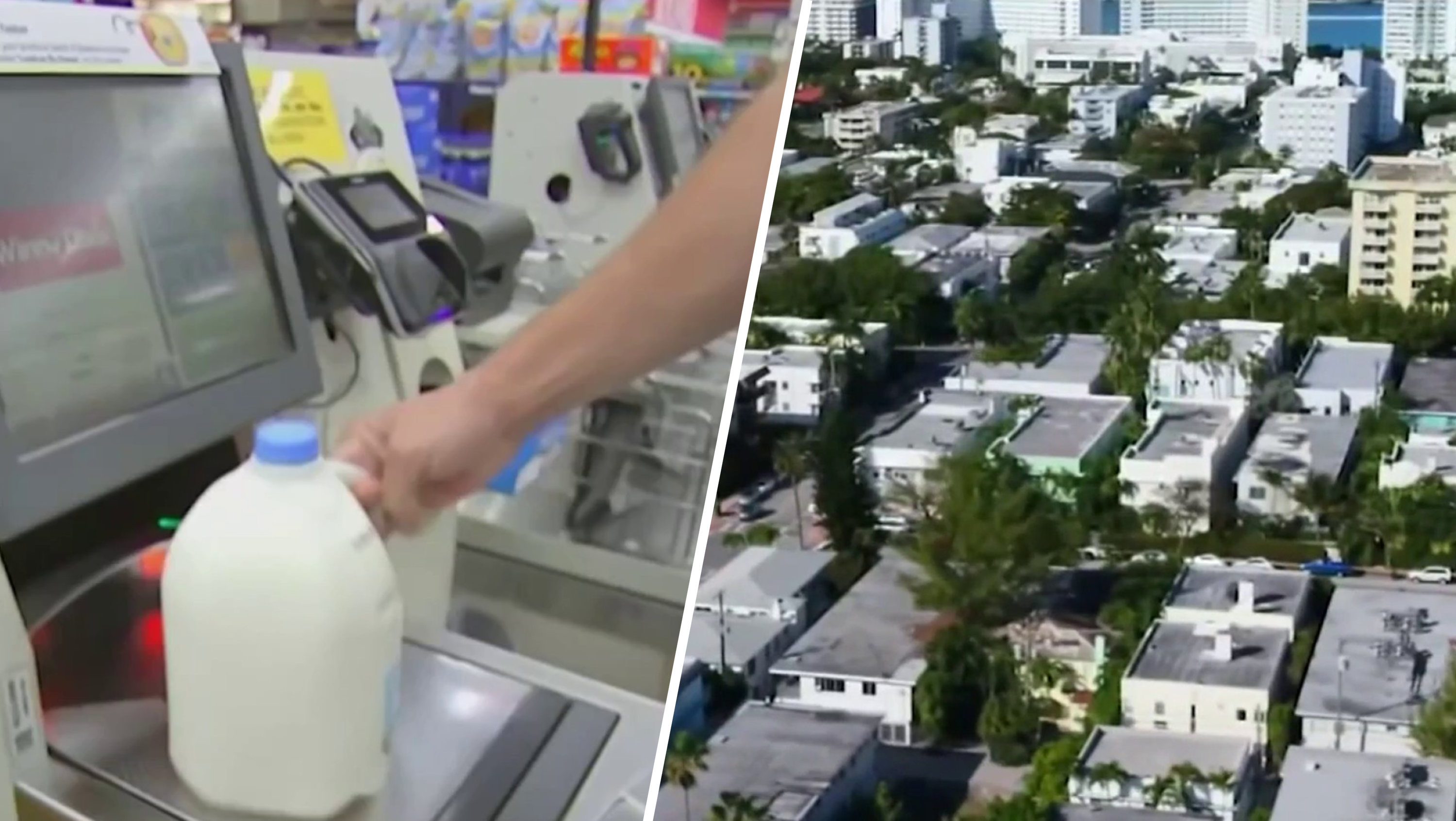Emails obtained by NBC 6 Investigators show how Miami-Dade Mayor Carlos Gimenez went from calling emergency cell phone alerts a “bit overboard” to putting his name on them – and then eventually taking it back off.
From President Donald Trump listing his name on the coronavirus recovery checks, to Florida Agriculture Commissioner Nikki Fried putting her face and name on state gas pump stickers, eyebrows raise anytime a public service looks like it's coming from an individual running for office instead of the office that individual holds. That’s because elected officials aren’t allowed to campaign with public taxpayer funds. But determining if someone has crossed the line can be difficult to do.
It's why when Miami-Dade Mayor Carlos Gimenez’s name started to appear on emergency alerts sent to residents about the coronavirus crisis, we started asking questions and we weren’t the only ones.
Gimenez is currently running to represent the 26th Congressional District in the Republican primary in August. The winner of that race will take on incumbent Rep. Debbie Mucarsel-Powell (D-Florida) in November.
Emails obtained by NBC 6 Investigators show county staff decided to put and then take the mayor’s name out of the text alerts. The county has since eased off using the wireless emergency alert system for “Safer at Home” messages altogether.
Email Timeline
The Miami-Dade County Emergency Operation Center (EOC) began sending out public safety alerts in late March, asking residents to stay home.
The first one came on March 27, around 2 p.m.: “All residents are urged to remain in their homes except for essential activities.” It did not include his name and he said at the time he thought the alert was a bit much and that he didn’t direct EOC to send it.
“They may have gone a little bit overboard,” Gimenez said in a video update. “I’ve given the EOC clear direction so that doesn’t happen again.”
Then, residents received another alert. But this time, it was from Mayor Gimenez himself with his name on it.
“It just seemed overly dramatic and designed to get attention, rather than convey information,” said Philip Stoddard, a professor from Florida International University, and former mayor of the city of South Miami. “If you do a good job, people will remember that. But if you look like you’re promoting yourself, they’ll remember that too.”
Local
NBC 6 Investigators obtained internal emails about the decision through a public records request.
According to a March 30 email sent by Frank Rollason, the county’s director of emergency management to Charles Cyrille, a division director, Gimenez approved the use of the EOC system to send “Safer at Home” messages to cell phones across the county. This came after the mayor’s “a bit overboard” comments in response to the first alert that was sent by EOC.
The plan was to send the messages twice a day, mid-morning and early evening from then on out.
In an email, dated April 2, Rollason wrote, “we will add ‘message from Emergency Management’ and would alert all police agencies before the message went out in case they received inquiries about it.”
Several hours later, the county’s staff agreed on this message: “You are safer at home - maintain social distancing of 6 feet - Miami Dade Emergency Management.”
Then, on April 3 at 9 a.m., the mayor and his staff had a Zoom meeting.
Around 27 minutes later, Cyrille sent an email to Nixsa Serrano, a staffer in the county’s Office of Emergency Management, with an updated version of the message that included the mayor’s name: “You are safer at home - maintain social distancing of 6 feet - Mayor Carlos Gimenez.”

A mayor’s spokesperson tells NBC 6 the decision to add Gimenez’s name originally came from Rollason in emergency management and the mayor agreed with the change.
The emails show county staff continue to discuss the alerts on April 3.
At 3:01 p.m., Rollason asked Myriam Marquez, the mayor’s communications director and senior advisor, “Did you get any feedback from the call this morning? We have not received any calls one way or the other, but with the Mayor’s name on the alert, maybe calls, pro or con, would come into his office.”
“No feedback. Think it worked fine,” Marquez responded.
The wireless alerts went out across Miami-Dade and as far south as Islamorada, which is outside of the county but within the district Gimenez is running for.
According to FEMA guidelines, wireless emergency alerts could go outside of a targeted area.
NBC 6 obtained FEMA guidelines that detail how cell phones inside a targeted area may be connected to a cell site outside of the alert area. Because those cell towers are activated, they could trigger alerts in phones outside of the target area – like Islamorada. “It many times also results in alerting mobile phones outside the targeted alert area,” the FEMA guidelines stated.
The Change Back
On April 6, three days after the email exchange, Gimenez was asked about why his name was on the alerts at a Zoom press conference.
“I’m the face of the county,” the mayor told reporters, adding he wanted people to know county leaders were requesting them to stay “Safer at Home” during the pandemic.
That morning, Rollason sent an email to Cyrille and Serrano telling them they would schedule the alerts for Mondays, Wednesdays, and Fridays, but the mayor’s name would no longer be on them.
“Today, we should get out a message this morning. SAME MESSAGE THAT WENT OUT THE FIRST TIME,” Rollason wrote. “Also, since the message is making it all the way down to Islamorada in the Keys, we should also alert Monroe County EOC.”
The mayor’s office didn’t respond to NBC 6 questions about the decision to take Gimenez’s name off the alerts.
There Is a Line to Cross
Per Florida election law, it is illegal for an officer or employee of the state, county, or city, to use their official authority or influence “for the purpose of interfering with an election or a nomination of office or coercing or influencing another person’s vote or affect the result thereof.”
It’s a law with a lot of wiggle room because it’s hard to pin down what “influence” really means.
In Miami-Dade, these cases are investigated by the county’s Commission on Ethics and Public Trust.
In a recent example, the commission found the mayor and multiple officials of the town of Surfside crossed the line and violated the law after producing videos highlighting their work and other aspects of the city.
The town’s election was March 17 and each of the elected officials had an opponent. The commission’s investigators found several instances where segments of the videos “could objectively be characterized as unrelated to the legitimate public purpose.” Surfside’s lawyer eventually reached an agreement with the commission’s executive director and the videos were pulled down.
The county’s Commission on Ethics and Public Trust has not received any complaints about the wireless emergency alerts from Miami-Dade County.



